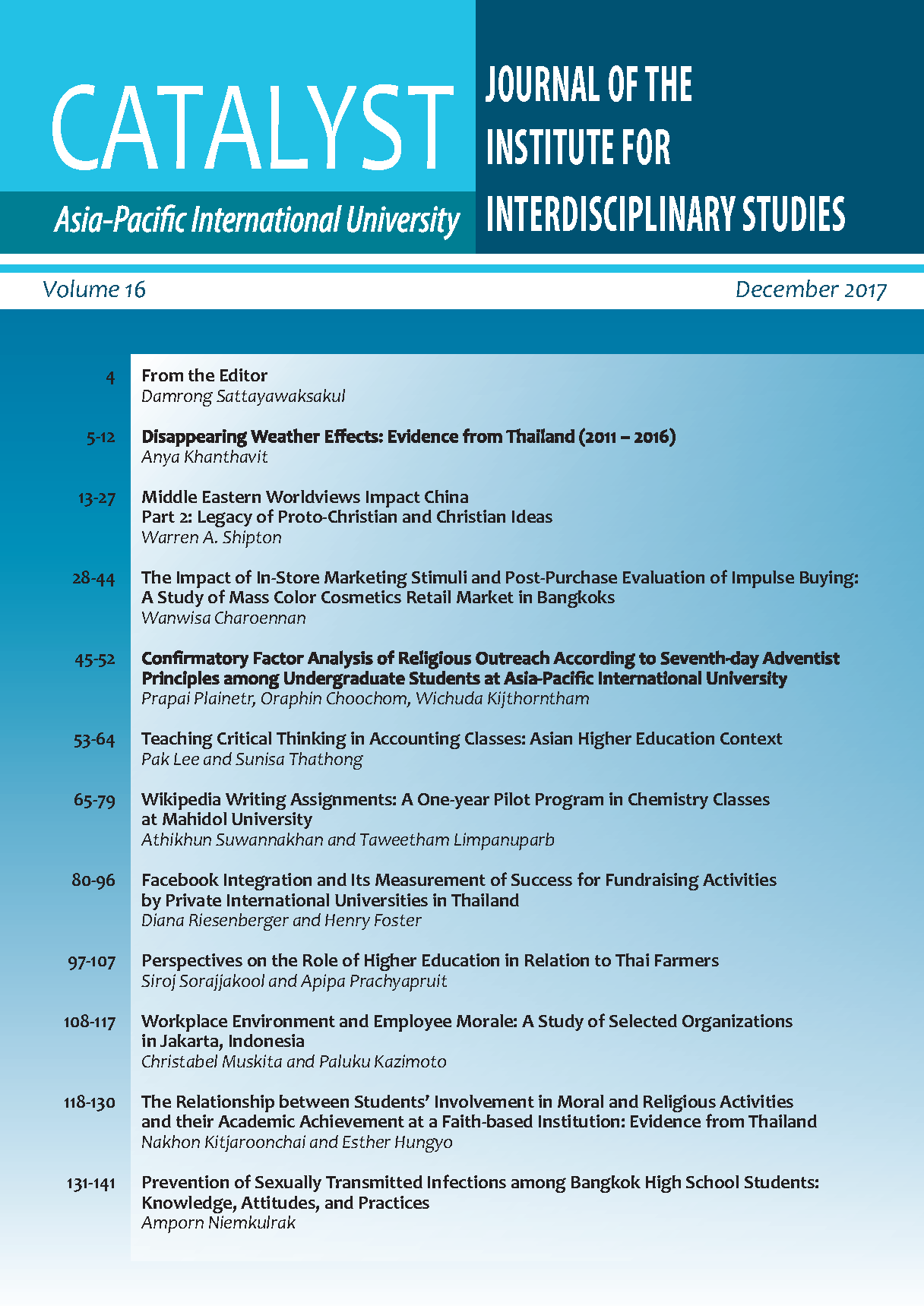Confirmatory Factor Analysis of Religious Outreach According to Seventh-day Adventist Principles among Undergraduate Students at Asia-Pacific International University
Main Article Content
Abstract
The objective of this research study was to analyze confirmatory factors of religious outreach according to Seventh-day Adventist principles among undergraduate students at Asia-Pacific International University by survey research. The sample was comprised of 567 Seventh-day Adventist undergraduate students studying in the second semester of the 2015 academic year. The members of the sample were selected by judgmental sampling, and the data were collected by using an instrument comprised of items that used a six-point rating scale and had a reliability level of 0.883. In addition, descriptive statistics were used to analyze the data, and LISREL was used to confirm and analyze the factors. The research results showed that religious outreach according to Seventh-day Adventist principles is consistent with the empirical data after adjusting the model. The factor loading range for each question was between 0.64 to 0.84, and religious outreach practice according to Seventh-day Adventist principles was conveyed by speech, by writing, and by role modeling.
Article Details

This work is licensed under a Creative Commons Attribution-NonCommercial-NoDerivatives 4.0 International License.
Copyright: Asia-Pacific International University reserve exclusive rights to publish, reproduce and distribute the manuscript and all contents therein.
References
Charuchinda, A. (2003). Religious Behavior of Urban Society: A Case Study of Wat Sanamnok and Wat Sanamnai Tambon Chalor Amphoe Bang Kruai Nonthaburi Province. Master of Arts Thesis (Anthropology) Bangkok: Graduate School, Silpakorn University.
Department of Religious Affairs, Ministry of Culture. (2005). Action Plan Project to Promote Public Morality, 2006 Fiscal Year. Bangkok: Express Transportation Organization of Thailand Press.
Enell O. Hall. (1999). The Development of a Program for The Retention of New Members in The New Jerusalem Seventh-day Adventist Church. Doctor of Ministry Dissertation, Berrien Springs: Theological Seminary, Andrews University.
Inthasa, W. & Naphon, C. (1995). Buddhism in Globalization Period of Universal Religious Outreach Bangkok: DhammaThipatai Press.
Panaram, O. (2002). Mass Media and the Propagation of Buddhism. Master of Arts Thesis, (Buddhist Religion Studies) Bangkok: Graduate School, Chulalongkorn University.
Ramitanont, C. (1984). Phee Chao Nai. Bangkok: Payap Offset Print.
Saris, W. E. & Stronkorst, L. H. (1984). Causal Modeling in Nonexperimental Research: An Introduction to the LISREL Approach. Amsterdam: Sociometric Research Foundations.
Sriworrakul, M. (2004). Changes at family and community levels caused by belief in Christianity among Pgak'nyau. Master of Education Thesis (Non-Formal Education) Chiang Mai: Graduate School, Chiang Mai University. V
Vanindananda, N. (1993). Buddhist Parents’ Characteristics as Correlate of Child-Rearing Practices: Behavioral Science Approach. Research Report Vol. 50. Bangkok: Behavioral Science Research Institute, Srinakharinwirot University.
White, E. G. (1975). Desire of Ages (2nd edition). Translated by Seventh-day Adventist Church of Thailand. Bangkok: Thailand Publishing House.
White, E. G. (1905). The Ministry of Healing. United States of America: General Conference of Seventhday Adventists.


